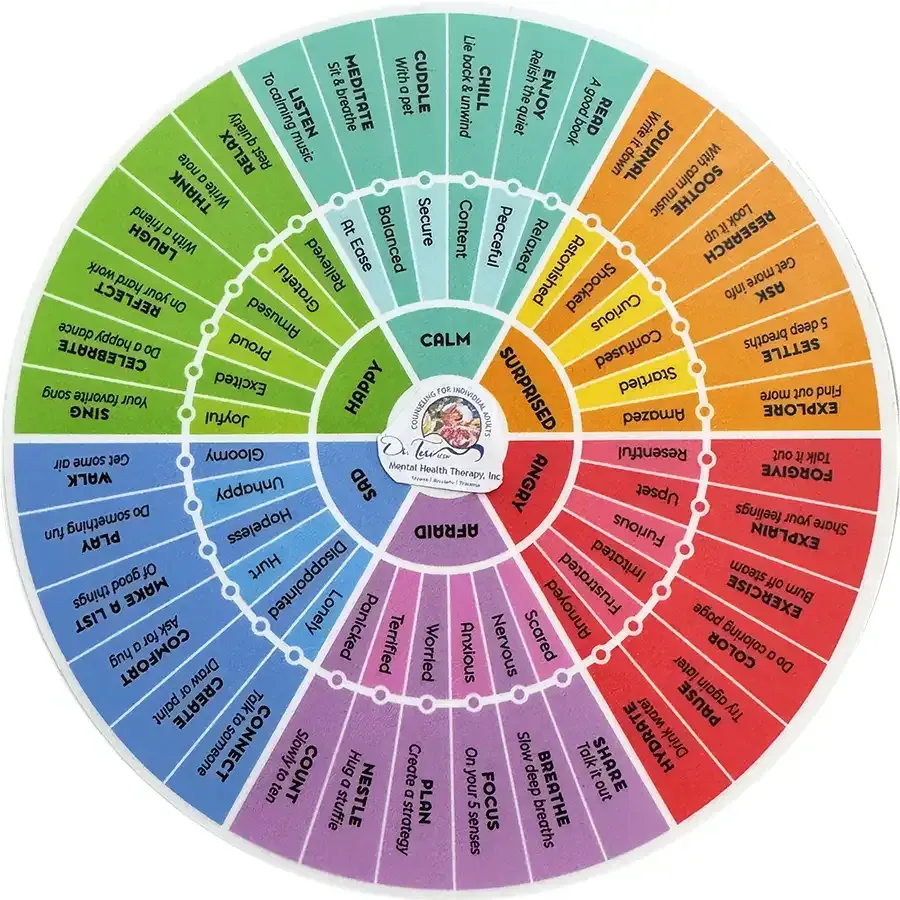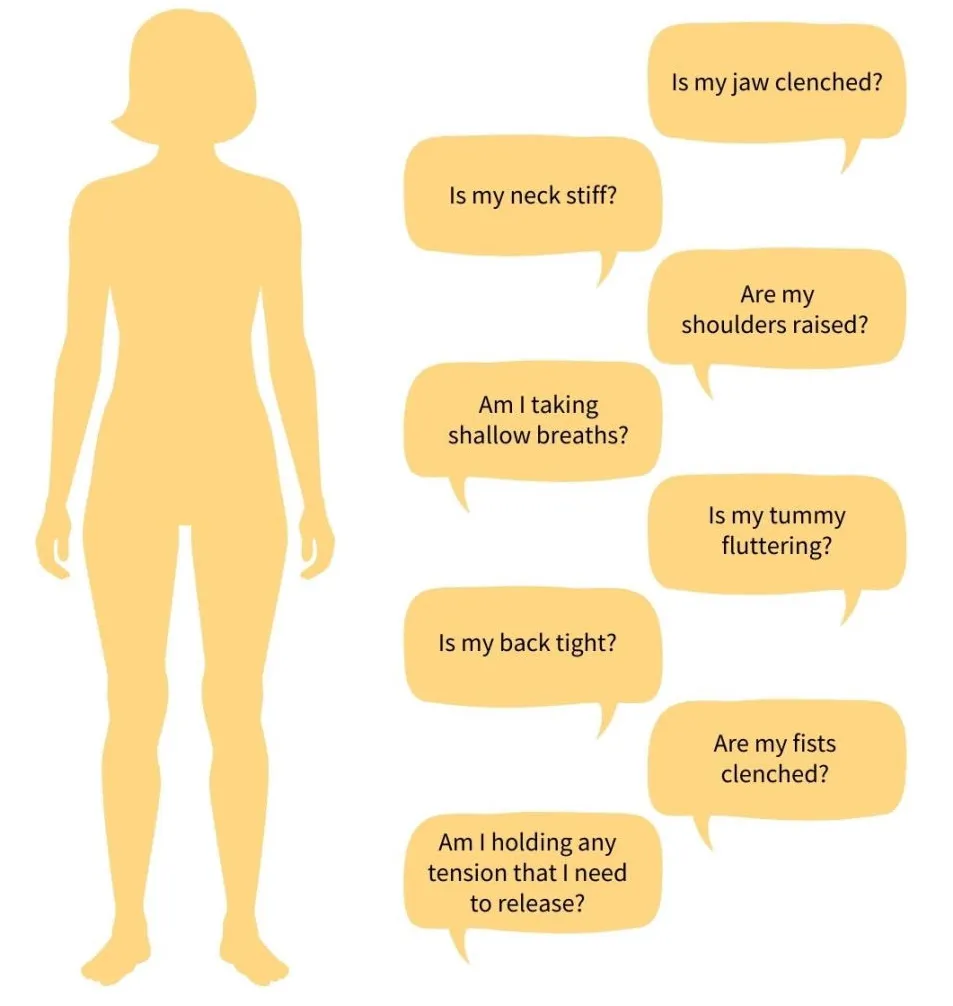Call or Text: 760-891-2333 | [email protected]

Tools to Support You
You're invited to explore this page, thoughtfully designed to support your journey with trusted tools, insightful information, and carefully curated materials. Whether you're seeking guidance, inspiration, or practical strategies, you'll find a range of resources to meet your needs and enhance the work you're doing between therapy sessions.

7 Levels of Listening
Not listening: Not paying attention to or ignoring the other person’s communications.
Pretend listening: Acting like or giving the impression that you are paying attention to another person’s communications, but in actuality not really paying attention to that individual.
Partially listening: Only focusing on part of the other person’s communication or only giving it your divided attention.
Focused listening: Giving the other person your undivided attention to his/her communication.
Interpretive listening: Going beyond just paying attention but really trying to understand what the other person is communicating.
Interactive listening: Being involved in the communications by asking clarifying questions or acknowledging understanding of the communication. Trying to empathize with them.
Engaged listening: Being fully engaged involves listening to the other person’s view, feelings, interpretations, values concerning what they are sharing as well as sharing yours. Both parties are given the opportunity to fully express their views, feelings & ideas.


Emotions Wheel
The Wheel of Emotions, developed by psychologist Robert Plutchik, is a valuable tool to help you understand and articulate your feelings. By categorizing emotions into primary, secondary, and tertiary levels, it allows you to identify complex emotional states and gain clarity about your experiences.
Using the wheel can empower you to express your emotions more accurately, leading to better communication and resolution of underlying issues.
Meditation Made Simple
Meditation doesn’t have to be scary or daunting! It is called a meditation practice for a reason, because the more you practice the easier it becomes.
And you don’t have to be perfect.

Beginner Meditation Guide (Step-by-Step)
1. Set a Realistic Timeframe
Start with 2–5 minutes daily.
You can build up gradually to 10 or 15 minutes as you become more comfortable.
2. Choose a Comfortable Posture
Sit on a chair, cushion, or lie down—whatever supports comfort and alertness.
Keep your back upright but relaxed.
3. Focus on the Breath
Gently bring your attention to the sensation of your breath—wherever you feel it most (nose, chest, belly).
No need to change it—just notice it.
4. Expect the Mind to Wander
When you notice your thoughts drifting (which is normal!), gently return to your breath.
Each return is part of the practice—not a mistake.
5. Use a Guided Meditation (Highly Recommended)
Apps like Insight Timer, Headspace, or Calm offer great beginner meditations.
Look for keywords like “beginner,” “5-minute mindfulness,” or “breathing meditation.”
6. Create a Ritual
Choose a consistent time of day (morning, lunch, bedtime).
Pair it with a habit (e.g., after brushing your teeth or before checking your phone).
Meditations by Dr. Teri
Guided Meditation Resources
Science Behind Meditation
Studies show that regular meditation can:
Reduce anxiety, stress, and depression
Enhance focus, memory, and emotional regulation
Improve sleep quality and immune function
Lower blood pressure and support heart health
Promote self-awareness, compassion, and inner calm
Studies show that regular meditation can:
Reduce anxiety, stress, and depression
Enhance focus, memory, and emotional regulation
Improve sleep quality and immune function
Lower blood pressure and support heart health
Promote self-awareness, compassion, and inner calm
Brain imaging research also shows that meditation can reshape the brain, strengthening areas linked to attention, empathy, and decision-making.
Whether used for personal growth, stress relief, or healing from trauma, meditation offers proven benefits that support whole-person wellness.
Meditation is highly effective in calming down one’s nervous system. It is especially helpful If you’re experiencing anxiety, hypervigilance or being super alert.
Feelings Body Scan
Take a few deep breaths and close your eyes.
Become award of your 5 senses (sight, sound, smell, taste, touch/feel).
Identify where you feel the feeling in your body and notice any sensations that arise.
Begin at the top of your head and end at the soles of your feet.
Stretch, move, massage, shake, or breathe into the areas of your body that are holding tension.


10 Guideposts for Wholehearted Living
Cultivating Authenticity:
Letting Go of What People ThinkCultivating Self‐Compassion:
Letting Go of PerfectionismCultivating a Resilient Spirit:
Letting Go of Numbing and PowerlessnessCultivating Gratitude and Joy:
Letting Go of Scarcity and Fear of the DarkCultivating Intuition and Trusting Faith:
Letting Go of the Need for CertaintyCultivating Creativity:
Letting Go of ComparisonCultivating Play and Rest:
Letting Go of Exhaustion as a Status SymbolCultivating Calm and Stillness:
Letting Go of Anxiety as a LifestyleCultivating Meaningful Work:
Letting Go of Self‐Doubt and “Supposed To”Cultivating Laughter, Song, and Dance:
Letting Go of Being Cool and “Always in Control”
Dr Teri's Therapeutic Playlist
May you have the peace that passes your own understanding to guard your heart and your mind.
Websites to Explore
Affirmations
ADD/ADHD
Abuse
Alcohol and Drug Abuse
Anxiety and Stress
Child/Adolescent Mental Health
College Student Mental Health
Depression/Bipolar Disorder
Eating Disorders
Grief
Grief.com
Healthy Living
LGBTQI
Mental Health
Mental Health Advocacy
Mindfulness
Miscellaneous
Obsessive Compulsive Disorder
Personality Disorders
Psychiatry
Psychology
San Diego and Imperial Counties Helpline
National Alliance on Mental Illness (NAMI) Website Help Contact Form
619-543-1434 M-F, 9-5
Designed to connect individuals and their family members with resources in the community.
Sleep
Smoking Cessation
Spiritual
Suicide Prevention
Veterans
Links provided for information only. Not responsible for the content, claims or representatives of the listed sites.
Crisis Numbers
If you or any other person may be in danger, the following resources can provide you with immediate help.
Natl. Domestic Violence Hotline:
800-799-7233
Natl. Suicide Prevention Lifeline:
800-273-TALK(8255)
National Hopeline Network:
1-800-SUICIDE 800-784-2433
Lifeline Crisis Chat
(Online Live Messaging):
http://www.crisischat.org/
Crisis Text Line:
Text "DESERVE" TO 741-741
Self-Harm Hotline:
1-800-DONT CUT1 (800) 366-8288
Family Violence Helpline:
800-996-6228
Planned Parenthood Hotline:
800-230-PLAN(7526)
American Association of Poison Control Centers: 800-222-1222
Natl. Council on Alcoholism and Drug Dependency Hope Line:
800-622-2255
Natl. Crisis Line Anorexia & Bulimia: 800-233-4357
LGBT Hotline:
888-843-4564
TREVOR Crisis Hotline:
866-488-7386
AIDS Crisis Line:
800-221-7044
Veteran's Crisis Info:
https://www.veteranscrisisline.net
Veteran's Crisis Number:
800-273-8255, Option 1
Veteran Administration Resources for COVID: MYVA311 844-698-2311, option 3
Teen Line Info:
https://teenlineonline.org
Child Abuse Hotline:
800-344-6000
Suicide Prevention:
http://suicideprevention.wikia.com
Elder Abuse Hotline:
800-510-2020
Domestic Violence, Rape/Sexual Assault Hotline: 858-272-1767
Crime Victims Hotline:
619-688-9200
Battered Women’s Services
(24-Hour Hotline): 619-234-3164
Testimonials
So Happy We Found Her
"From the very first day, I warmed up to Dr. Teri and was immediately comfortable with her. She helped me learn to better understand and process my own emotions and deal with things in a healthier and more productive way. I think Dr. Teri is great and am so happy that I found her!"
-S

Made a Big Difference
"Working with Dr. Teri has made a big difference in my life. Her compassionate, gentle approach and complete acceptance of me has allowed me to better understand myself and identify ways to change my thinking. I particularly appreciate how her faith guides our sessions when I invite it."
-B

Let's Connect
If you're ready to take the next step, I invite you to reach out for a free video or phone consultation.
Whether you're looking for short-term support or a longer therapeutic relationship, we’ll create a
plan tailored to your goals.
Serving clients in San Diego North Co & online across California and Texas
Phone: 760-891-2333 Email: [email protected]
Contact Dr. Teri using a secure form (via Hushmail).
If you are having an emergency, please CALL 988.
Visit suicidepreventionlifeline.org
to access the 988 Lifeline through text or chat.
If you need non-emergency assistance, in San Diego County, contact
the non-crisis WARMLINE: 619-295-1055. 7 days/wk, 3:30-11pm (except major holidays).

Teri Davis, Ed.D., LCSW #86976
Doctorate in Education, Masters in Social Work
No Surprises Act - You have the right to receive a Good Faith Estimate of what your services may cost.
Copyright 2025. Dr. Teri Psychotherapy. All Rights Reserved.
